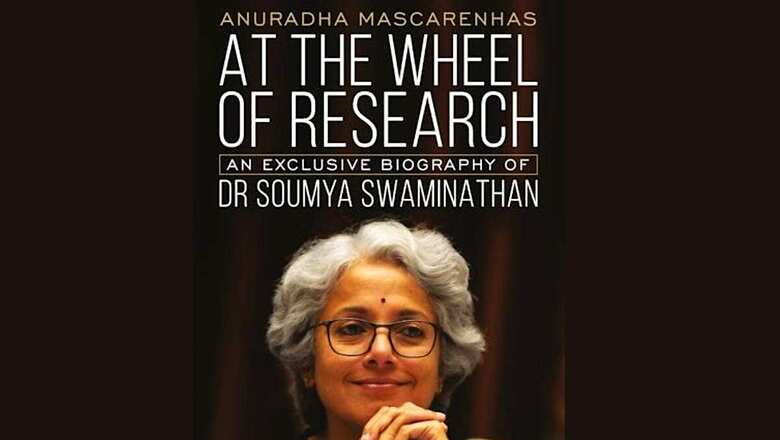
views
Anuradha Mascarenhas’ debut book, At the Wheel of Research (Bloomsbury, Rs 599), sheds light on the life and times of Dr Soumya Swaminathan, India’s foremost clinician-researcher. Dr Swaminathan’s pivotal role in shaping India’s response to HIV and TB research, and her appointment as the first chief scientist at the World Health Organization (WHO) just before the onset of the Covid-19 pandemic that at its peak claimed a life every three minutes, forms the crux of the narrative. One of the biography’s strengths lies in its exploration of Dr Swaminathan’s profound impact on shaping India’s response to HIV and TB.
A few years into my work on HIV, there was a growing realisation that tackling TB was key to saving lives, and as MSF’s (Medecins Sans Frontieres’) representative of the Campaign for Access to Essential Medicines, I met the soft-spoken scientist at an HIV conference in Chennai. Dr Soumya’s tenure at NIRT treating patients and at the same time building evidence with her team for molecular tests, shorter regimens, preventive therapy and more child-friendly tools resonate with MSF’s own journey as a treatment provider to find better tests and regimens for DR-TB for its patients in India.
Her team’s research efforts at ICMR’s NIRT shaped MSF and the TB community’s public health advocacy and action on access to innovative diagnostics and lifesaving treatments for TB and DR-TB for adults and children in India and in other high-burden settings. Mascarenhas delves into Dr Swaminathan’s enduring legacy for research in India and highlights her instrumental role in convincing policymakers to establish the TB Research Consortium under her leadership at ICMR (Indian Council of Medical Research).
Her relationships with her patients, Bunty with leukaemia, and Noorie, the trans-woman activist living with HIV in Chennai, offer invaluable insights into her clinical work. Her leadership in shunning discriminatory practices rampant in the early days of the AIDS epidemic among clinicians and treating people living with HIV at a time when there were no antiretrovirals available, paved the way for her contemporaries to follow suit. Mascarenhas navigates through Swaminathan’s commitment to TB survivors and TB-affected populations, emphasising her advocacy for their inclusion in policy-making at the WHO and other high-level meetings.
Mascarenhas addresses the question of Dr Swaminathan’s decision to leave her position at the Department of Health Research and ICMR to join WHO. At the time in 2017, she was at the forefront of driving research and policy decisions to improve public health programmes, the detection and treatment of diseases such as DR-TB, the introduction of the HPV vaccine to prevent cervical cancer, and India’s fledging response to non-communicable diseases. We finally had a clinician who understood that research was important to drive access to better tools for the most vulnerable, building collaborations with institutions across the world for patient-centred care was critical, and inclusion of affected communities is key to driving research in the right direction, and convince policymakers and ministers to support these initiatives at ICMR. Her departure from such a leadership position in medical research was a setback for people and public health in India.
In the end, the book highlights that the decision proved to be key to shaping WHO’s scientific response to the public health emergency, in partnership with Dr Tedros the first Director General from Africa provided leadership amidst the pandemic. The WHO needed to step up to address the need for prevention measures, diagnostics, medicines and vaccines and ensure equitable access to these tools. As the chief scientist at WHO, she helped shape the R&D roadmap, led a global forum for Covid-19 research, supported the Solidarity clinical trial for Covid treatments and highlighted the inequalities in accessing Covid-19 vaccines between high-income and low-middle-income countries.
Her scientific credentials strengthened WHO’s response in tackling dangerous mis/disinformation in Covid-19 and as a spokesperson for the WHO, she brought evidence-based information to millions of people across the world. The biography offers insight into the WHO and global diplomacy around Covid-19 and the challenges the institution faces amidst the pandemic.
The biography concludes by highlighting Swaminathan’s return to India as the head of the Swaminathan Foundation, where she continues to champion interdisciplinary research at the intersection of agriculture, climate change, and health. This new chapter in her career underscores her enduring dedication to advancing scientific innovation and addressing pressing global challenges.
Overall, Mascarenhas’ biography is a valuable read for anyone interested in the intersection of medicine, research, and equity.
Leena Menghaney is a lawyer and South Asia head of the Access Campaign in Medecins Sans Frontieres/Doctors Without Borders. Views expressed are personal.














Comments
0 comment